Year 8 Options
A link to the Year 8 Options Form will be emailed to student's school email account.
The Options Form will open at 6pm on Monday 18th March and close at 6pm on Tuesday 19th March.
Welcome & Options Outline
The Year 8 Options Process
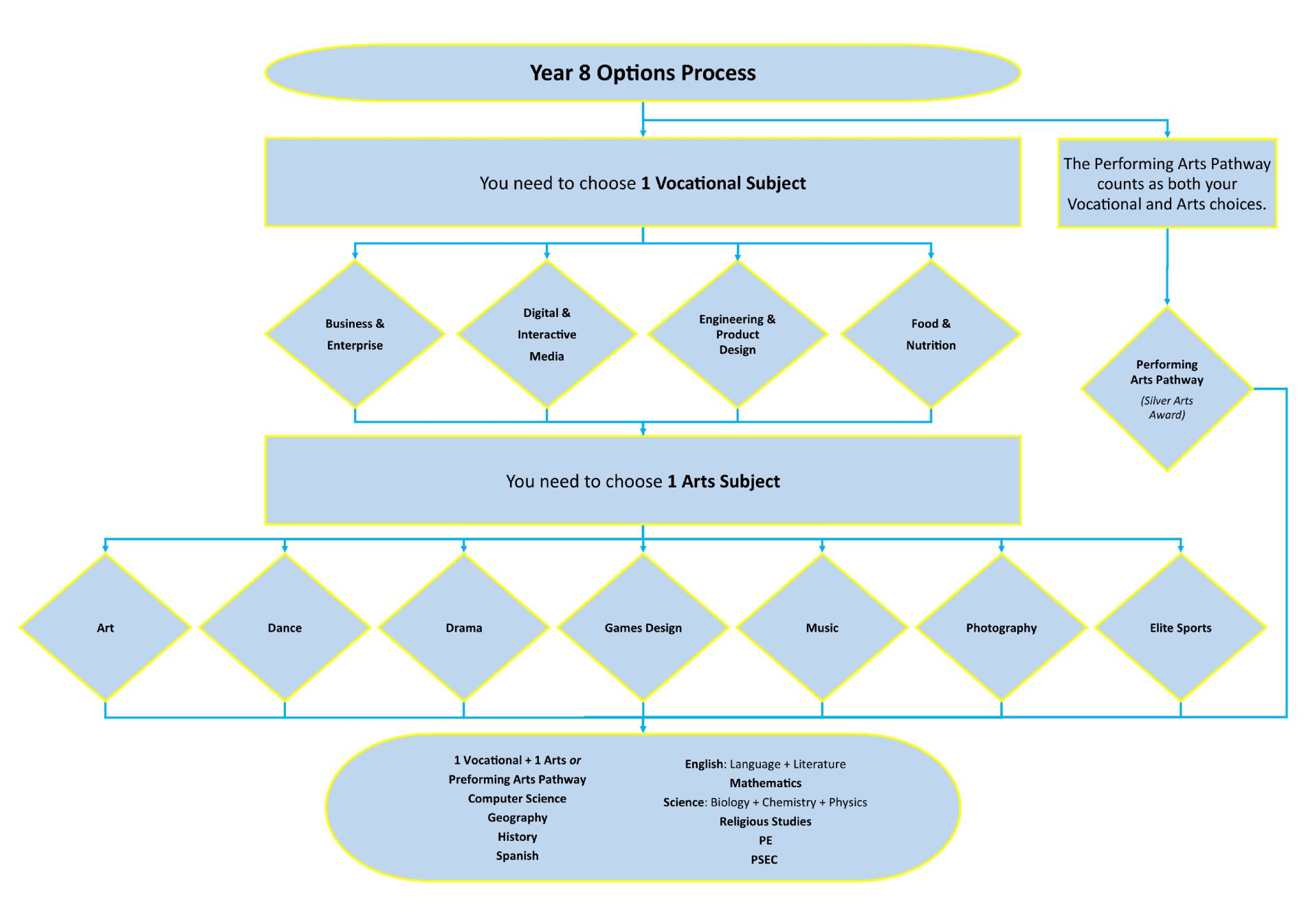
Advice and Guidance
There is loads of information and advice out there, about choosing your options. We would particularly recommend checking out CareerPilot and Youth Employment UK. You will also find information and useful links on the Careers Education, Information, Advice and Guidance section of our site.
We have created a Careers Guidance Team, on Microsoft Teams, which all students can join. This is full of information about careers and options for the future, and we will continue to update this with resources. To access this, students need to click ‘Join or create team’ and either search for ‘Careers Guidance’ or enter the following code: yqews4w
You can also speak to our Careers Advisor, Mr Towsey. The easiest way to contact him is via email (gtowsey@westhatch.net), or you can pop into the Careers Centre before school, or at Break. You can find him on Lunch Duty at the Snack Shack.
Our Top Tips for picking your options are as follows;
- Know the course, not just the subject.
Make sure you do your research and are familiar with what the content of each subject involves; do not judge it by the title alone. Also, remember that courses change, so what your friends or siblings may have covered in the past, is not necessarily what you will study.
- Pick something you like, not just because your friends pick it.
Your friends might enjoy a subject you do not and even if you pick the same subject, there is no guarantee you will be in the same class.
- Do not base your choices on your current teacher.
Speak to your teachers about your options but remember that next year they might not be teaching your class. Do not pick a subject because of the teacher you think you will have.
- If you are not sure, pick something you love.
If you are not sure which subjects to do, then pick something you find interesting or are good at.
- Do not stress, too much.
The reality is that it does not matter which subjects you choose, the most important thing is to achieve good results. The subjects you pick now will not limit your choices after Year 11.
Options questions and who to speak to?
If you have any questions about your Option choices, or you want a bit of advice about what subjects might be the best for you, there are loads of information and support available to you.
If your question relates to a specific subject, check out the subject information below. You could also speak to the relevant teachers or Head of Department.
You can speak to our Careers Advisor, Mr Towsey, who oversees the options process: the easiest way to contact him is via email (gtowsey@westhatch.net).
You could also either;
1) e-mail options@westhatch.net
2) Click here to open a live chat.
3) Complete this question form: forms.office.com/r/wyRgDEkbgq
Welcome from Mr Sinfield
Welcome to your Year 8 Options
This webpage outlines all the information, advice and guidance that will help you to make the best decisions about which subjects to study over the next 3 years.
Why is it important?
The choices and decisions you make now may have a significant impact on your future. These decisions should not be made lightly, so we will offer you as much support as we can, to ensure you follow the right path.
What can I choose?
Welcome to our bridging year. In year 8 ready for year 9, we allow a small amount of choice and new subjects to experience. This helps you to build confidence in subjects you enjoy and also gain experience across a wider choice of subjects if you want to than is traditional. In year 9, you can then choose your GCSE options ready for year 10 with a clearer idea of what you might like to study. You can make one choice from a group of vocational subjects and one choice from a group of arts subjects. Alternatively, you can choose to follow our Performing Arts Pathways. You will study these for a year and sit an assessment at the end of Year 9 and complete these courses.
Who can help?
It is important that you have as much information and advice as possible. There are a number of people you can speak to from myself to your Form Tutors, others in your Form and your teachers. You can also speak to Mr Towsey, who leads on the options process and is our Careers Advisor. He is based in the Careers Centre (at the top of S block). If you have any questions do not hesitate to ask!
What next?
Look through all the information below. We will try to give you as much information and support as possible before you choose your options so that you make the best choices for you and your future.
Yours sincerely,
Mr A Sinfield
Deputy Headteacher
Performing Arts Pathway
Performing Arts Pathway
* If you select the Performing Arts Pathway,
you do not make a Vocational or Arts choice.
Y9 Arts Award Breakdown
WHAT IS THE ARTS AWARD?
Silver Arts Award is a Level 2 qualification on the Regulated Qualifications Framework (RQF) and is designed for ages 14 and above, but is open to young people aged 11 to 25.
WHERE CAN I FIND OUT MORE INFORMATION ABOUT THE QUALIFICATION?
https://www.artsaward.org.uk/
HOW AM I ASSESSED?
To achieve a Silver Arts Award, young people collect evidence in an individual arts portfolio of their experiences of:
Arts practice and pathways
◾identifying and planning an arts challenge
◾implementing and reviewing their arts challenge
◾reviewing arts events and sharing their views
◾researching future opportunities and careers in the arts
Arts leadership
◾identifying a leadership role and planning the project's aims
◾planning the practical issues
◾being an effective arts leader
◾working effectively with others
◾reviewing their project and leadership role
WHAT WILL MY YEAR LOOK LIKE?
UNIT: (SEPTEMBER-DECEMBER)
Unit 1 Arts Award Challenge: Performing a Christmas pantomime to primary school children, family and peers.
SKILLS TAUGHT:
Musical theatre, Constructive feedback, following direction, self/peer reflection, adapting to an audience, dramatic techniques such as split scene, thought tracking, monologue and hot seating, leadership, performance and research.
UNIT: (DECEMBER-JULY)
Unit 2 Arts Award: Arts Leadership- leading workshops to primary school children. Experiencing a professional workshop. Researching arts careers. Experience watching professional theatre and writing reviews.
SKILLS TAUGHT:
Understanding of leadership skills and qualities, artistic aims and scope, assess interest and abilities of an audience, developing an appropriate project plan, executing a workshop, understanding arts careers and evaluation of self-performance and working alongside others.
Example of 'Portfolio of Evidence'
~> Example 1
~> Example 2
Vocational Options
Business & Enterprise
Overview
The course is designed to introduce learners to Business and Enterprise. It has a vocational and hand-on element to the course requiring learners to apply theory to real businesses and realistic scenarios.
The course has been developed to enthuse and inspire learners about a career in business and enterprise. The course will appeal to learners who wish to either set up their own business in the future, move in to employment or progress on to further study within the Business field.
Topics Covered
Unit 1: Introduction to business and enterprise
This unit aims to give learners an introduction to business and enterprise. It gives learners an introduction to start up projects and helps them to identify risks and rewards. Learners will obtain an insight in to different types of businesses and how they are set up, understand the role of an entrepreneur and their characteristics, gain an understanding of how businesses target different types of customers and get the opportunity to investigate risks and rewards for new business enterprises in their local area.
Unit 2: Marketing for business and enterprise
This unit aims to give learners an insight into market research and different marketing opportunities and techniques. It gives learners an insight in to why businesses use marketing techniques to target different types of customers, impact of social media and the internet, different strategies used by businesses to persuade a customer to visit their businesses and buy their products/services and an opportunity to investigate a business and the marketing techniques used.
Unit 3: Finance for business and enterprise
This unit aims to provide learners with a basic knowledge and understanding of business finance for a new business or enterprise. It gives learners an insight in to how businesses are funded, sources of finance available, the costs a business incurs, the importance of keeping financial records and an opportunity to investigate different types of taxation businesses must pay.
Unit 4: Plan, develop and participate in a business or enterprise project
This unit aims to develop a project plan and implement the project. The learner will then go on to evaluate the overall success of the project. The project will be based on all the concepts learnt in units 1, 2 and 3 and will allow learners to put their theory in to practice by taking part and running a small business enterprise. The unit helps to develop key skills in team work, building positive relationships, presentation, research and numeracy skills as well as analytical and evaluative skills.
|
Assessment |
|
|
Unit |
Assessment |
|
1-Introduction to Business and Enterprise |
Portfolio of Work |
|
2-Marketing for Business and Enterprise |
Portfolio of Work |
|
3-Finance for Business and Enterprise |
Portfolio of Work |
|
4-Plan, develop and participate in a business or enterprise project |
Portfolio of Work |
This course could lead to studying Business Studies or Economics in Year 10/11.
Click here for Careers in the Curriculum resources.
Digital & Interactive Media
This course is aimed at learners wishing to gain an understanding of the interactive media industry and develop basic skills across a range of areas and contexts within the subject.
Students will learn about the media industry, conventions, concepts and terminology through the different forms that they will study.
This course could lead to studying Media Studies in Year 10/11.
Click here for Careers in the Curriculum resources.
Engineering & Product Design
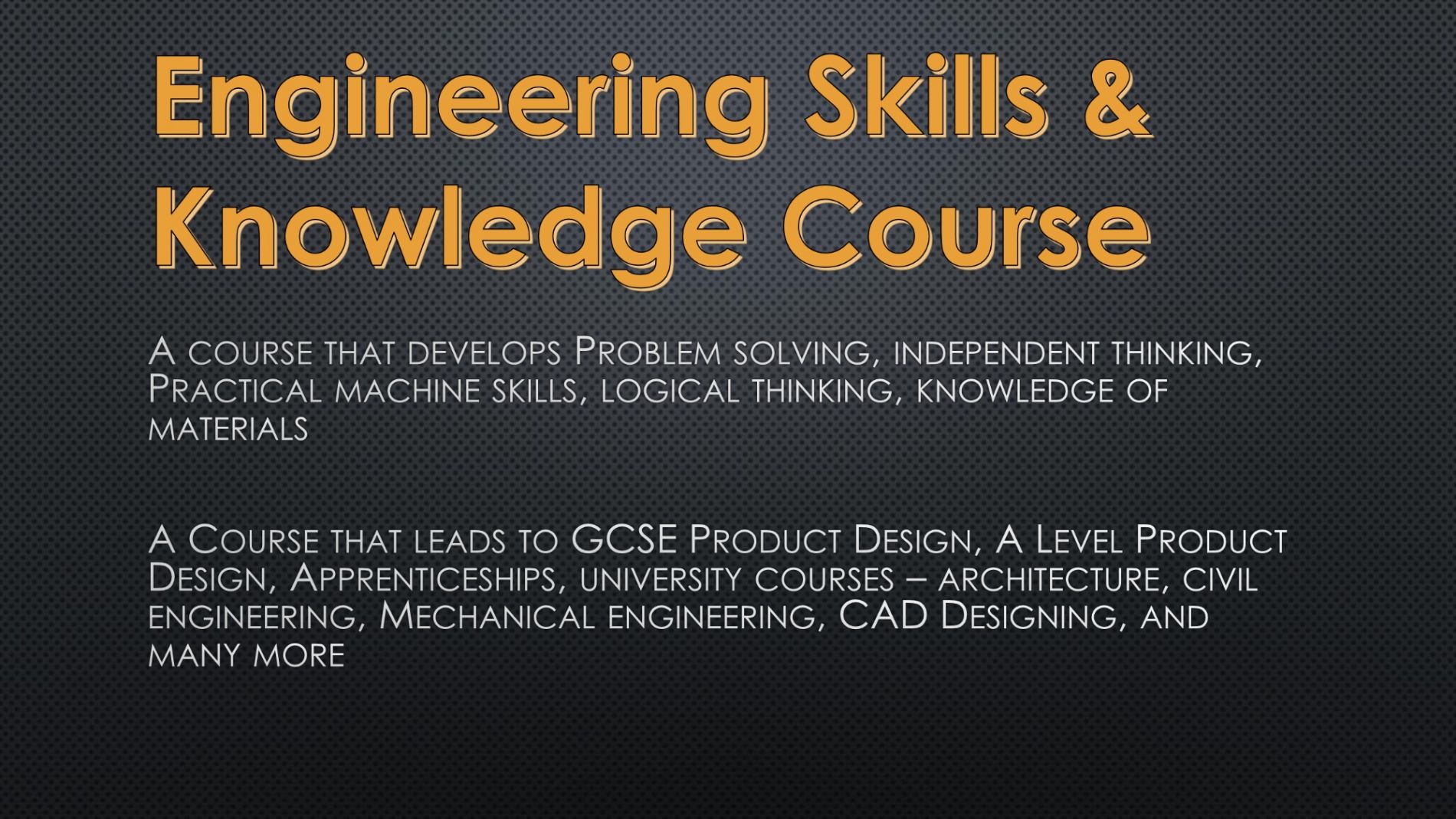
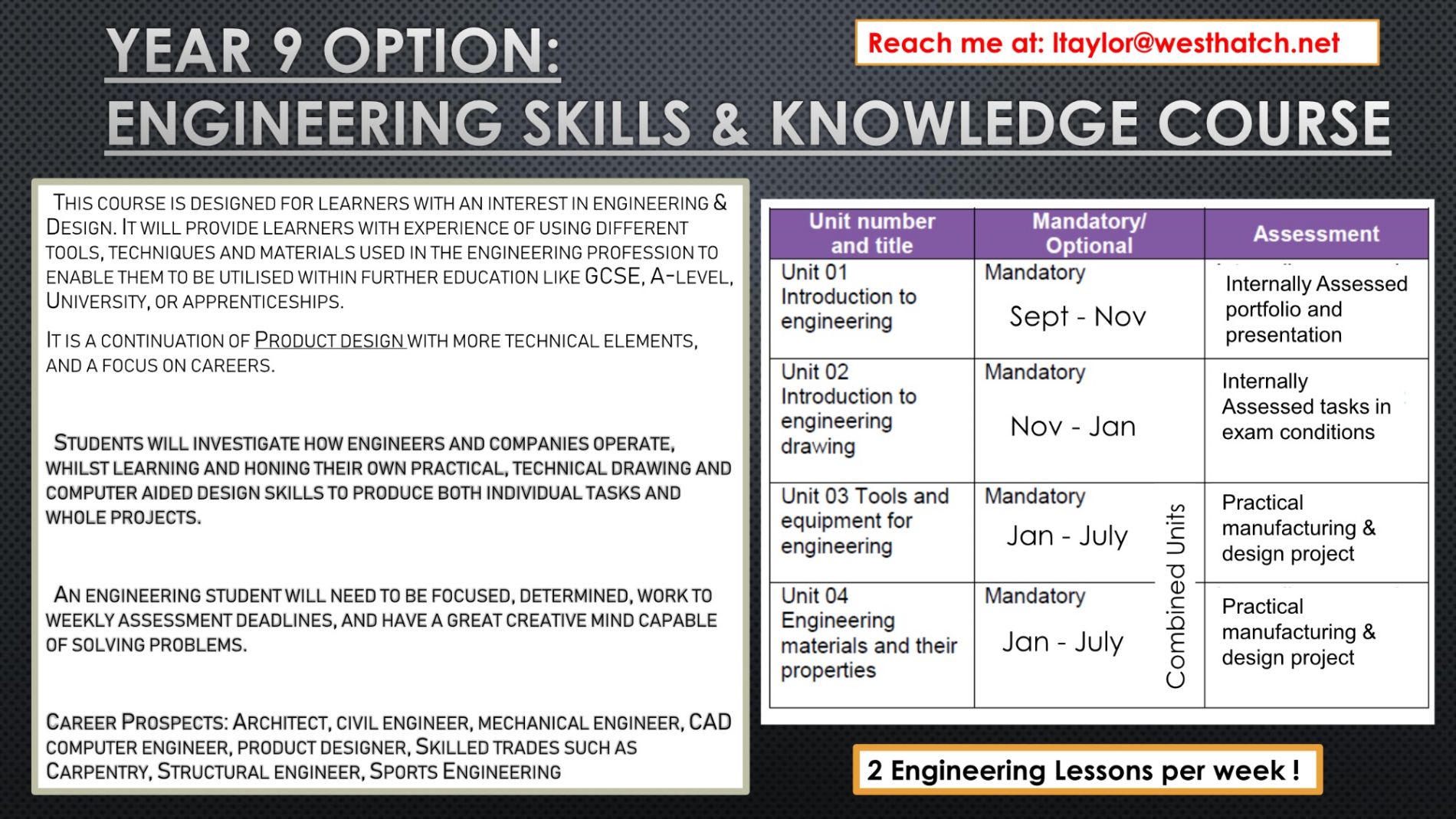
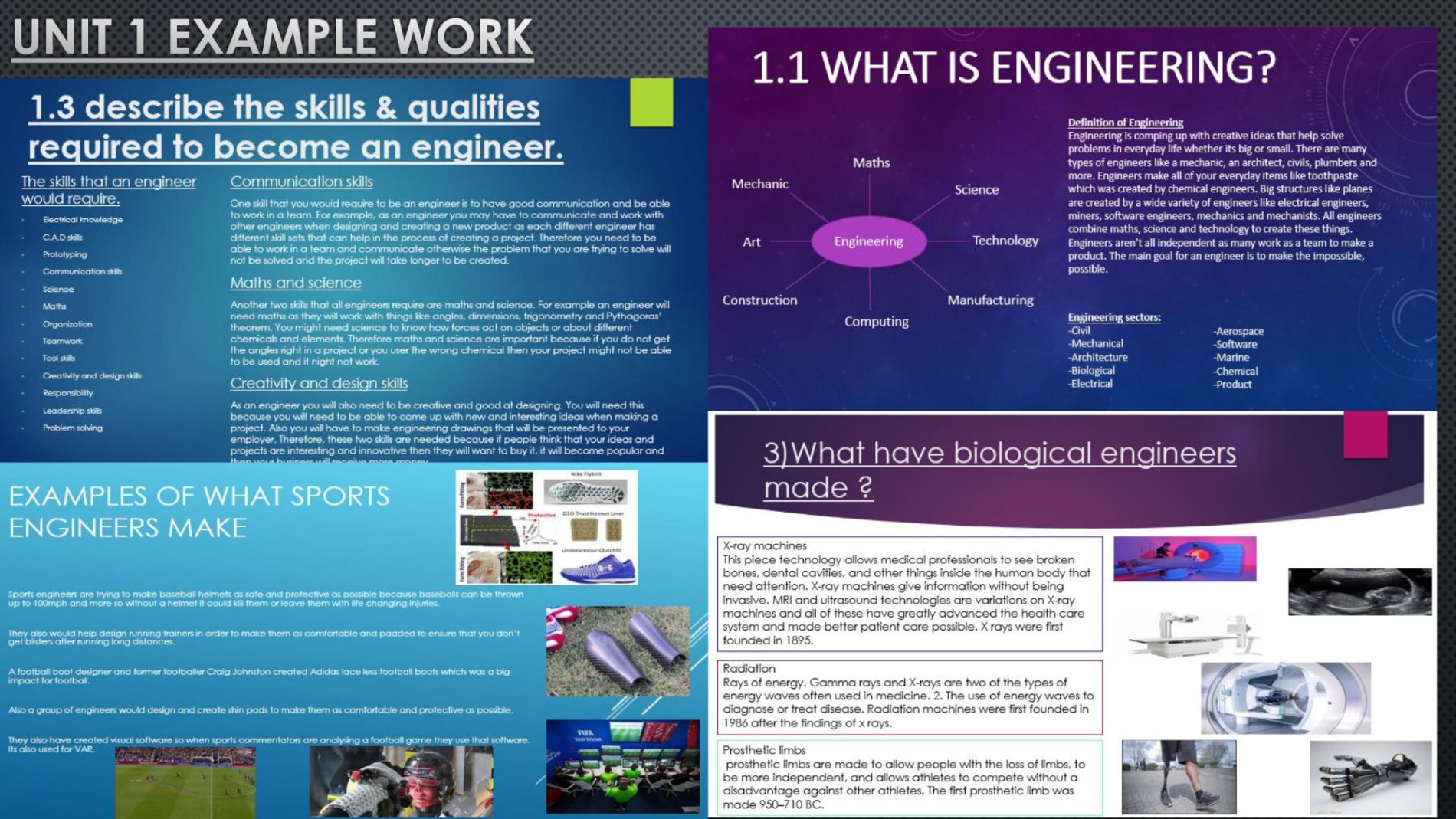
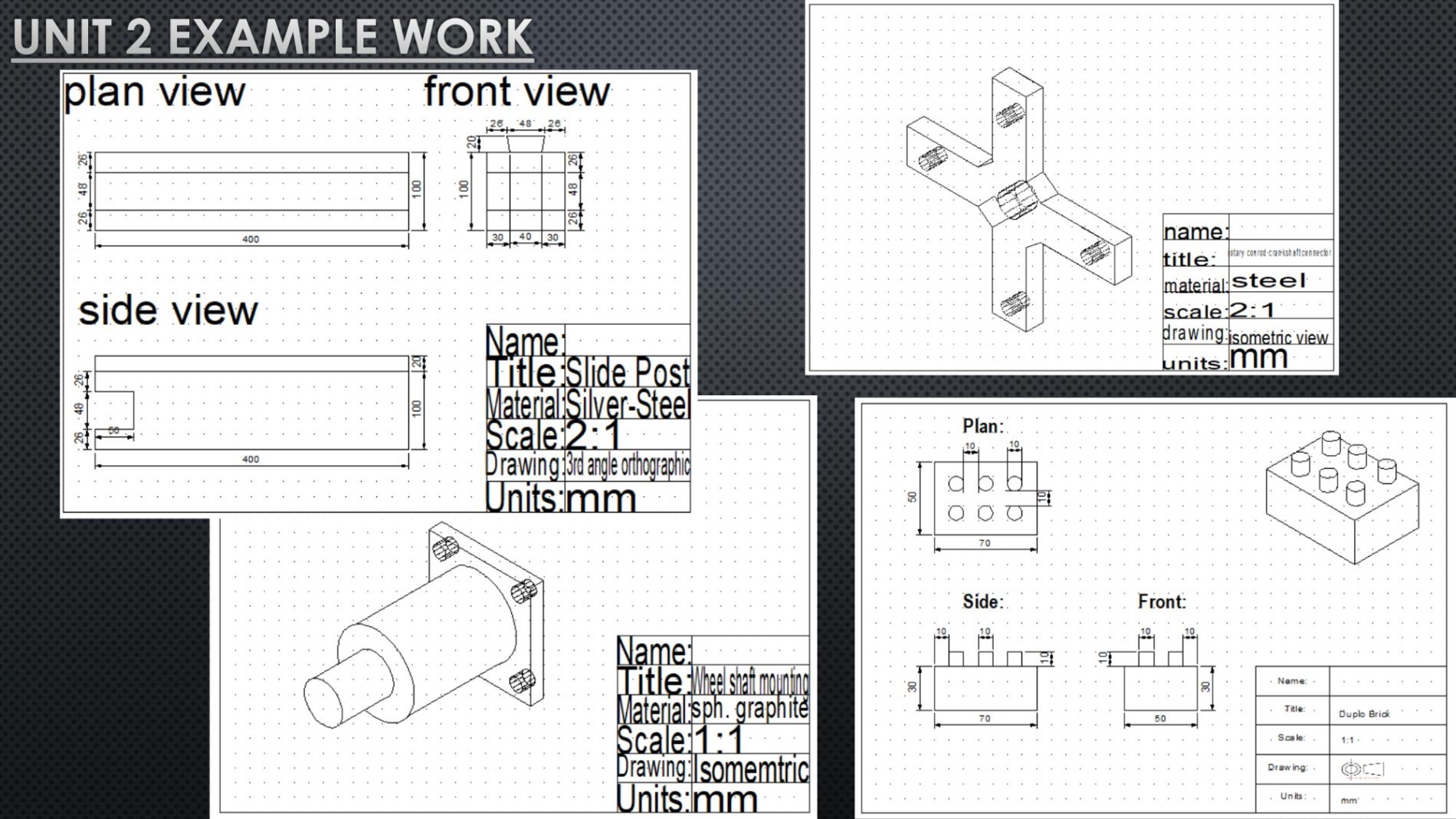
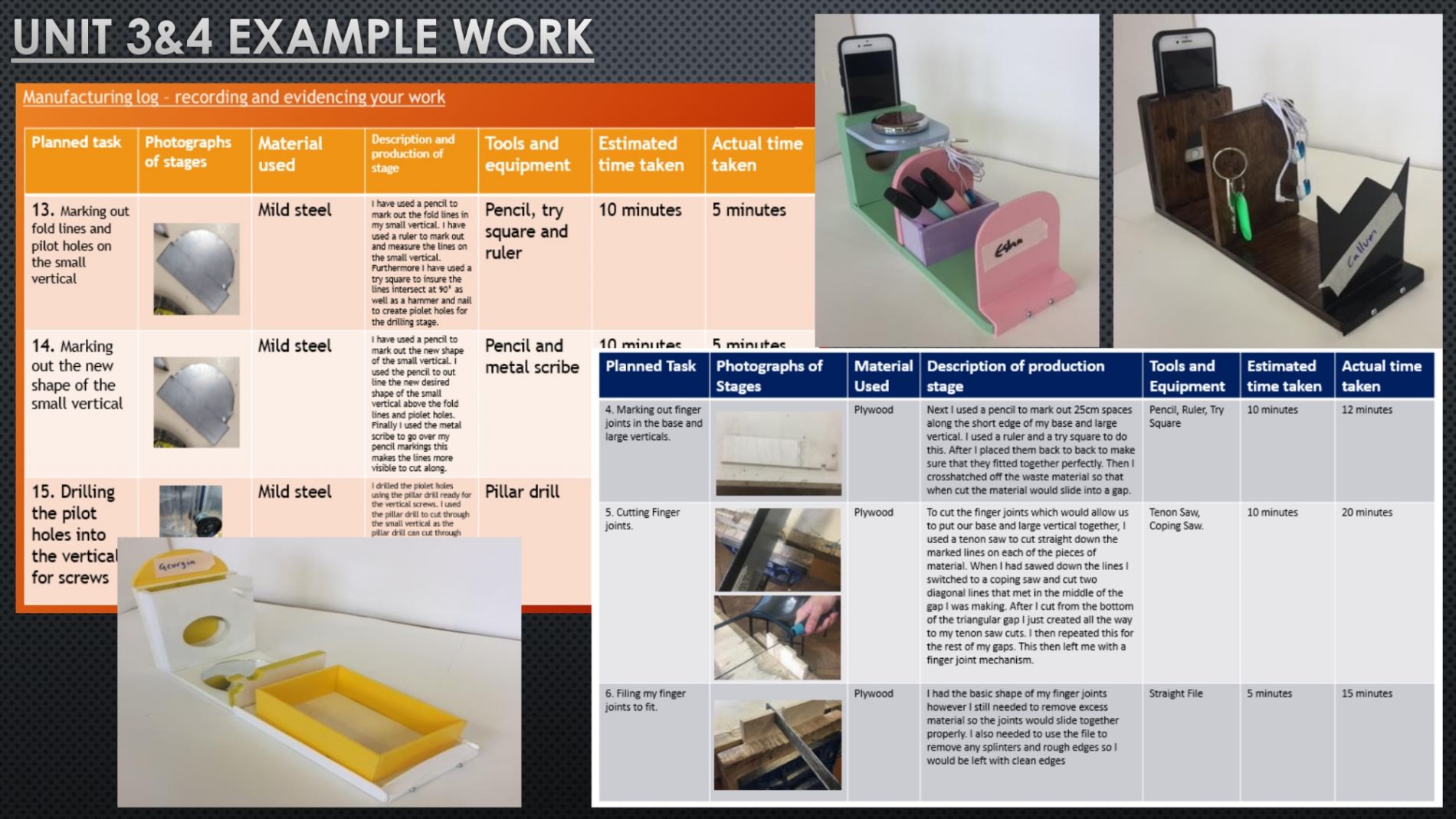
This course could lead to studying Product Design in Year 10/11.
Click here for Careers in the Curriculum resources.
Food & Nutrition
This course could lead to studying Food Preparation & Nutrition in Year 10/11.
Click here for Careers in the Curriculum resources.
Arts Options
Art
Example Lesson
This course could lead to studying Art in Years 10/11.
Click here for Careers in the Curriculum resources.
Dance
Overview
Develop your dance skills and techniques through the reproduction of your dance repertoire.
Study different styles of dance, such as jazz, contemporary and street.
Develop your understanding of Dance by examining practitioners’ work and the processes used to create a performance.
Prepare a piece, individually or as part of a group.
Have the opportunity to develop your performance skills, through involvement with the Dance Shows.
This course would be ideal preparation for anyone considering studying BTEC Dance in Year 10/11.
Information, Advice or Question
If you would like further information and advice please speak to Miss Judge.
Drama
Overview
Over the year we aim for the students to grow as artists and arts leaders, inspiring them to connect with and take part in the wider arts world through taking challenges in an art form.
Young people get to:
· Discover the enjoyment of creating and participating in Drama
· Develop their creativity and leadership skills
· Learn new skills and share them with others
· Get to work with or experience working with creative arts professionals
· Gain experience and knowledge to progress into further education and employment
Young people take on challenges in Drama, participate in arts activities, experience arts events, get inspired by artists and share their skills with others. Young people create a portfolio to keep a record of their creative journey. Along the way, they are supported by their teacher.
Transferable Skills you gain from Drama...
|
Team working Verbal and written communication skills Problem-solving Time management Research skills |
People management Creativity Discipline Empathy Confidence |
This course could lead to studying Drama in Years 10/11.
Click here for Careers in the Curriculum resources.
Games Design
Games Design will teach you skills sought by the industry, such as coding and programming, enabling you to take software tools and create new playable games from your ideas.
From the seed of an idea to a fully playable game on store shelves; you will learn about the processes behind making successful games.
Topics covered:
- Introduction to Game Design
- Concepts and Design
- Marketing and materials
- Prototype Development
- Interaction Design
- Understanding Player Experience
This course is aimed at those who enjoy computing, but also have an eye for detail and are creative problem-solvers. There is a large element of programming involved and artistic design with lots of knowledge and theory about the decisions behind the most popular games and what the future of gaming could look like.
Music
Overview
Over the year we aim for the students to grow as musicians, performers & music producers
Students will get to:
Learn how to use the recording studio
Mix & master their own tracks using music software
Record artists in the Live room
Collaborate with other musicians in songwriting
Enhance their skills in their own instruments by forming bands
Learn the basics in guitar, ukulele, piano & drums
Young people will perform and produce music, and learn the skills to be able work in a recording studio. They will learn about music software to create & produce their own tracks and perform (if they want to) in at least 2 concerts throughout the year
Transferable Skills you gain from Music
|
Working as a team Verbal and written communication skills Problem-solving Time management Research skills |
People management Creativity Discipline Empathy Confidence |
This course could lead to studying Music in Years 10/11.
Click here for Careers in the Curriculum resources.
Photography
This course could lead to studying Art in Years 10/11.
Click here for Careers in the Curriculum resources.
Sports: Elite Sports
SPORTING EXCELLENCE: LIFE OF THE ELITES
Medals, money, and media – the face of elite sport. However, have you ever wondered what it takes to be an elite athlete?
During this course, you will discover an insight into the multifaceted underpinnings of elite performance, by exploring real-life case studies. Students will be taught across a range of topics, such as;
-
diet and nutrition
-
careers in industry,
-
the effects of altitude,
-
sport injuries
-
mental toughness.
-
the sacrifices of professional athletes.
The course will contain classroom and computer-based learning through a variety of activities, along with the opportunity to develop your own aerobic endurance – a fundamental component of most sporting ventures.
This course is suited for learners with an enthusiasm for sport and exercise; pupils will be required to complete tasks demonstrating their understanding of the concepts being taught. Pupils will have the opportunity to work both independently and as a group through discussions, written work and creative Oracy activities.
The programme aims to introduce the science behind athletic performance and to generate a curiosity for further study. Learners who succeed across all strands will be commended at the end of year 9.
This course could lead to GCSE PE or Cambridge National Sports Science in Years 10 and 11.
This course could lead to studying Physical Education in Years 10/11.
Click here for Careers in the Curriculum resources.
If an Options Subject is oversubscribed, decisions regarding student allocation will take into consideration students’ behaviour, attitude and progress.
Alongside your choices, all students will also study the following subjects:
Computer Science
Geography
History
Spanish
Religious Studies
English Language and English Literature
Mathematics
Biology, Chemistry, and Physics
Physical Education (Practical PE)
